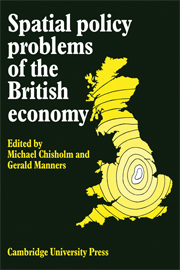Book contents
- Frontmatter
- Contents
- List of tables
- List of figures
- Preface
- 1 Geographical space: a new dimension of public concern and policy
- 2 Employment mobility in Britain
- 3 Leads and lags in inter-regional systems: a study of the cyclic fluctuations in the South West economy
- 4 Spatial structure of metropolitan England and Wales
- 5 Poverty and the urban system
- 6 Some economic and spatial characteristics of the British energy market
- 7 Growth, technical change and planning problems in heavy industry with special reference to the chemical industry
- 8 Freight transport costs, industrial location and regional development
- Index
6 - Some economic and spatial characteristics of the British energy market
Published online by Cambridge University Press: 21 May 2010
- Frontmatter
- Contents
- List of tables
- List of figures
- Preface
- 1 Geographical space: a new dimension of public concern and policy
- 2 Employment mobility in Britain
- 3 Leads and lags in inter-regional systems: a study of the cyclic fluctuations in the South West economy
- 4 Spatial structure of metropolitan England and Wales
- 5 Poverty and the urban system
- 6 Some economic and spatial characteristics of the British energy market
- 7 Growth, technical change and planning problems in heavy industry with special reference to the chemical industry
- 8 Freight transport costs, industrial location and regional development
- Index
Summary
Over the last decade the primary fuel base of the British economy has been substantially widened. To the country's traditional and indigenous energy mainstay, coal, and its first modern partner, oil, has been added the power of the atom and of natural gas. In the process, and not withstanding the new-found hydrocarbon resources under the North Sea, the emotional reluctance of a time-honoured energy exporter for the first time to become dependent upon substantial energy imports has been to a large extent overcome. Meanwhile, the producer–supplier industries operating in the British energy market have steadily improved the efficiency of their production, processing, transport and distribution systems and have there-by come to enjoy falling real costs albeit in varying degrees. The market, as a consequence, has progressively developed a more competitive quality.
Setting the pace in these developments has been the oil industry. Taking advantage of the international industry's widening resource base – especially the development of low cost fields in North and West Africa – and the global persistence of excess production capacity relative to existing demands (Adelman, 1964 a, 1964b), it has been able to procure its crude-oil supplies in a market which has been characterised by a downward pressure upon field prices. Despite the rise in the general price level, the 1970 price for Persian Gulf crude oil f.o.b. stood at about one-third of what it was twenty-five years earlier.
- Type
- Chapter
- Information
- Spatial Policy Problems of the British Economy , pp. 146 - 179Publisher: Cambridge University PressPrint publication year: 1971
- 1
- Cited by



